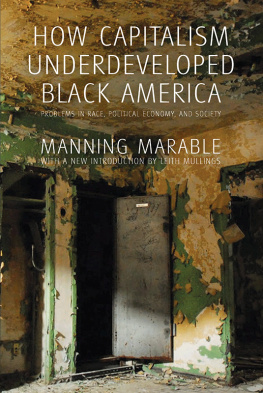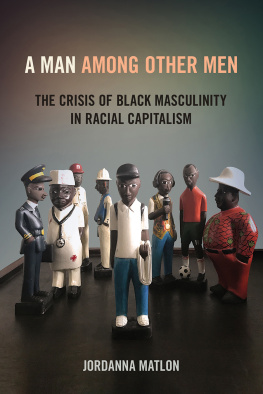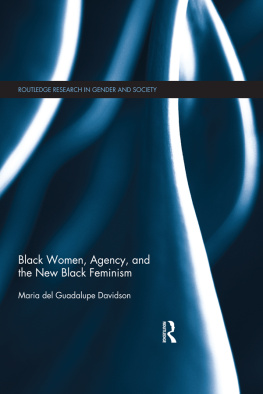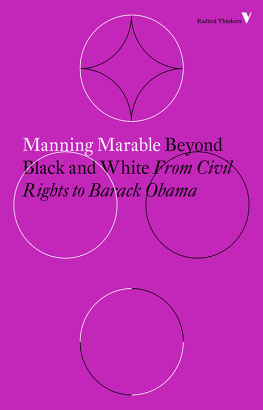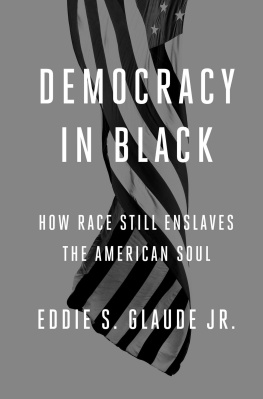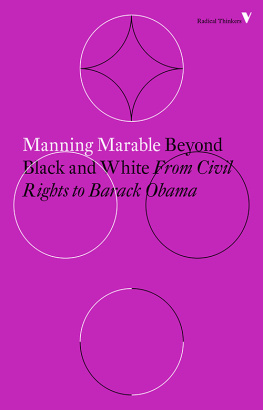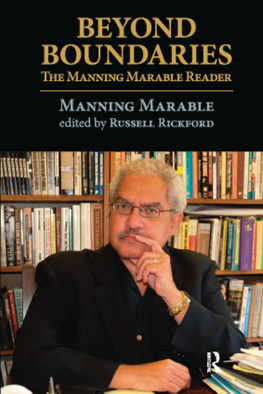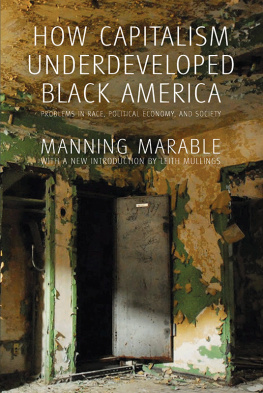Praise for How Capitalism Underdeveloped Black America
The reissue of Manning Marables How Capitalism Underdeveloped Black America confirms that this is a classic work of political history and social criticism. Unfortunately, Marables blistering insights into racial injustice and economic inequality remain depressingly relevant. But the good news is that Marables prescient analysisand his eloquent and self-critical preface to this new editionwill prove critical in helping us to think through and conquer the oppressive forces that remain.
Michael Eric Dyson, author of I May Not Get There with You: The True Martin Luther King, Jr.
For those of us who came of political age in the 1980s, Manning Marables How Capitalism Underdeveloped Black America was one of our bibles. Published during the cold winter of Reaganism, he introduced a new generation of Black activists/thinkers to class and gender struggles within Black communities, the political economy of incarceration, the limitations of Black capitalism, and the nearly forgotten vision of what a socialist future might look like. Two decades later, Marables urgent and hopeful voice is as relevant as ever.
Robin D. G. Kelley, author of Yo Mamas DisFunktional!: Fighting the Culture Wars in Urban America
For a Latina, How Capitalism Underdeveloped Black America is not only a powerful analysis of the Black experience; Marable also opens the way to perceiving our Black-Brown commonalities. Through Marables eyes, we see how Chicanos and other Latinos share so much with African Americans: the importance of learning our true history; of seeing how our oppression began with the violent seizure of our labor (and land, in the cases of Mexico and Puerto Rico); the sexist oppression of women as basic; the need for decent education; and the rise of imprisonment ratesalong with internal issues like the role of our middle class; the church; and the homophobia that dehumanizes us. Above all, Marable helps us see how all roads point to the need for radical action by peoples united to win a new, socialist society.
Elizabeth Martnez, author of De Colores Means All of Us: Latina Views for a Multi-Colored Century
Marable is of that unique band of African American intellectuals whose scholarship arises from, and has a direct bearing on, the struggles of ordinary Black peopleand, in the process, throws up the symbiosis between race and class. A new edition of his pathbreaking work, How Capitalism Underdeveloped Black America, should open out these perspectives and challenges to a new generation of readers.
A. Sivanandan, editor, Race & Class
Following in the footsteps of W. E. B. Du Bois, Oliver C. Cox, and Walter Rodney, Manning Marables How Capitalism Underdeveloped Black America is a groundbreaking study of the political economy of Black America. It has stood the test of time and remains essential reading for a critical understanding of the interconnection of racism and economic exploitation.
Robert L. Allen, senior editor, Black Scholar
In How Capitalism Underdeveloped Black America, Manning Marable created a classic work that continues to stand as a seminal text for those on the left interested in a grounded, coherent, and insightful analysis of the struggle for Black liberation. For example, long before other progressive activists/academics were ready to articulate, let alone deal with, the devastating impact of patriarchy on Black progress, Marable set forth on just such a path in the pages of this important book. Thus, in many ways, this text is illustrative of Marables own long-standing commitment to lead a progressive and revolutionary fight, not the most popular one. In an age in which public intellectuals with little or no connection to the lives and struggles of those they write about and supposedly represent seem to dominate the scene, it is timely that How Capitalism Underdeveloped Black America should reappear. Hopefully, this book will remind us all of the need for serious and grounded analysis about the condition of those most marginal in our society. It is a must-read (or reread) for anyone committed to the theory and practice of struggle.
Cathy J. Cohen, professor of political science and African-American studies, Yale University
Professor Manning Marables How Capitalism Underdeveloped Black America remains one of the most informative and insightful books for understanding historical and contemporary relationships among race, power, and wealth in the United States. This book reminds us that race and class divisions continue to represent a fundamental social, economic, and political reality in this nation. Marable explains how class interests mold racial policies and politics, but also how Black people, and other communities of color, as well, reflect and challenge such interests. In fact, the author shows convincingly how a Black community in alliance with other communities and mobilized on behalf of a progressive social and economic agenda remains a serious threat to the capitalist order in this society.
James Jennings, Trotter Institute, University of Massachusetts Boston
There are influential booksand then there are classics. Marables How Capitalism Underdeveloped Black America is a clear case of the latter. Drawing upon the interpretive insights of Walter Rodney, the work advanced nearly all of the central concerns of the African American struggle for liberation in a world that continues to be hostile and exploitative. Concise and unapologetic, its endurance over the past two decades is a testament to its message of praxis and freedom.
Lewis R. Gordon, chair of Africana Studies and professor of Africana Studies, Religious Studies,
and Modern Culture and Media, Brown University
In 1983, when How Capitalism Underdeveloped Black America first appeared, there existed a notable void in the intellectual delineation of the deteriorating circumstances confronting millions of African Americans. The 1980 election and subsequent administration of President Ronald Reagan signaled a national political rotation that would simultaneously attack Black progress and celebrate capitalism. Although an earlier generation of Black scholars, such as C. L. R. James and W. E. B. Du Bois, argued that the Black condition in the United States had to be situated always within a framework that understood and critiqued capitalism, it was time for a new voice. Already a well-known commentator and writer on Black life, Manning Marables breakthrough work launched a new era in Black scholarship challenging left and Black orthodoxy in both the academy and alternative intellectual arenas. How Capitalism Underdeveloped Black America unfolds as a coherent and comprehensive work that addresses not only capitalism writ large, but also specific dimensions of Black life, such as sexism and patriarchy, criminal justice, poverty, religion, and education.
Marable elaborates on the contours of Black life with a scholarly vigor but in a manner that is accessible, a feature that has continued to characterize his voluminous body of work.... How Capitalism Underdeveloped Black America stands the test of time in many ways. Globalization has exacerbated, rather than eliminated, all of the contradictions described by Marables classic text. A new edition, which updates the tranformations that happened since 1983, yet retains the basic sound arguments, is a welcome and pivotal literary and political event.
Clarence Lusane, author of Race in the Global Era
Contents
SECTION ONE
THE BLACK MAJORITY: THE DOMESTIC PERIPHERY
Introduction to the First Edition
Inequality and the Burden of Capitalist Democracy: A Point of View on Black History
What have I or those I represent to do with your national independence? Are the great principles of political freedom and of natural justice, embodied in that Declaration of Independence , extended to us?... Your high independence only reveals the immeasurable distance between us. The blessings in which you this day rejoice are not enjoyed in common. The rich inheritance of justice, liberty, prosperity, and independence bequeathed by your fathers is shared by you, not by me. The sunlight that brought life and healing to you has brought stripes and death to me. This Fourth of July is yours , not mine . You may rejoice, I must mourn.... What to the American slave is your Fourth of July? I answer, a day that reveals to him more than all other days of the year, the gross injustice and cruelty to which he is the constant victim. To him, your celebration is a sham; your boasted liberty an unholy license...
Next page
